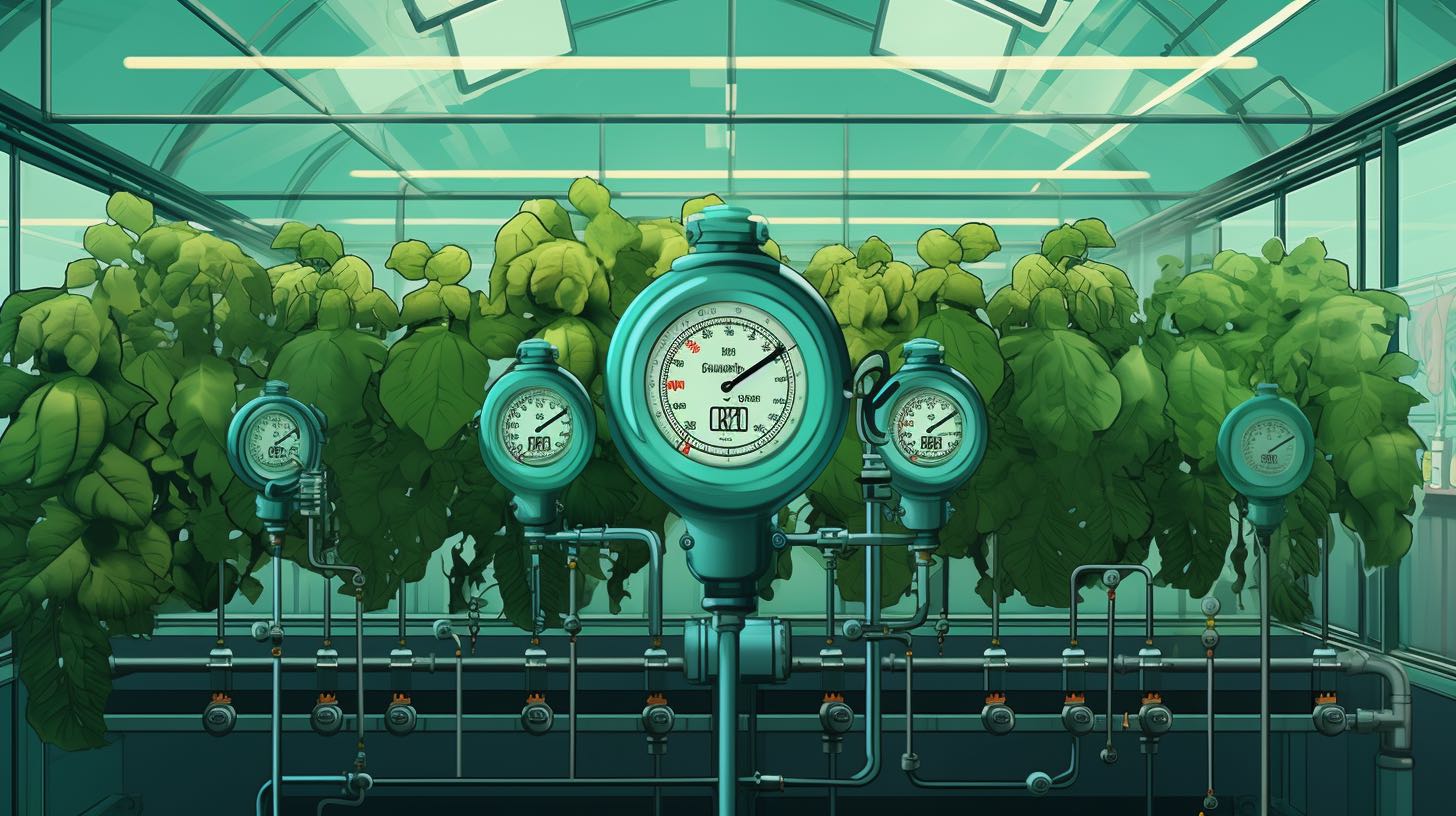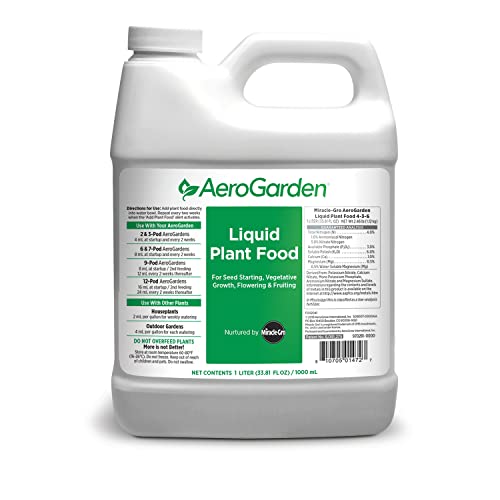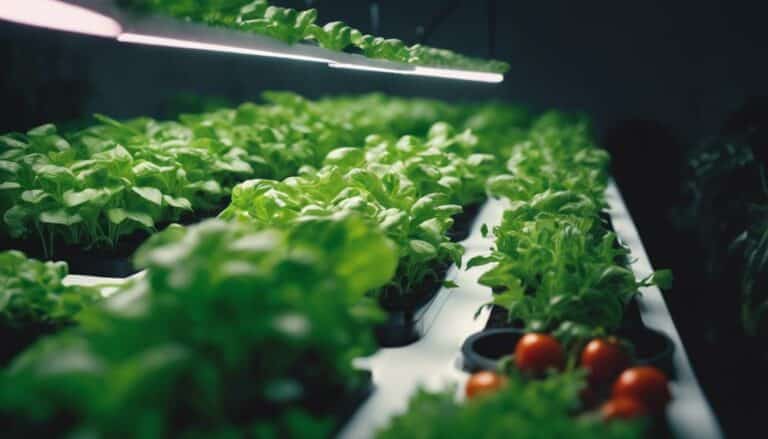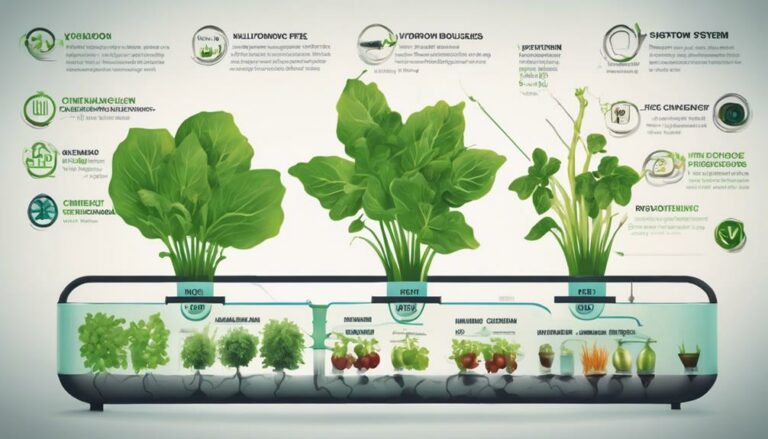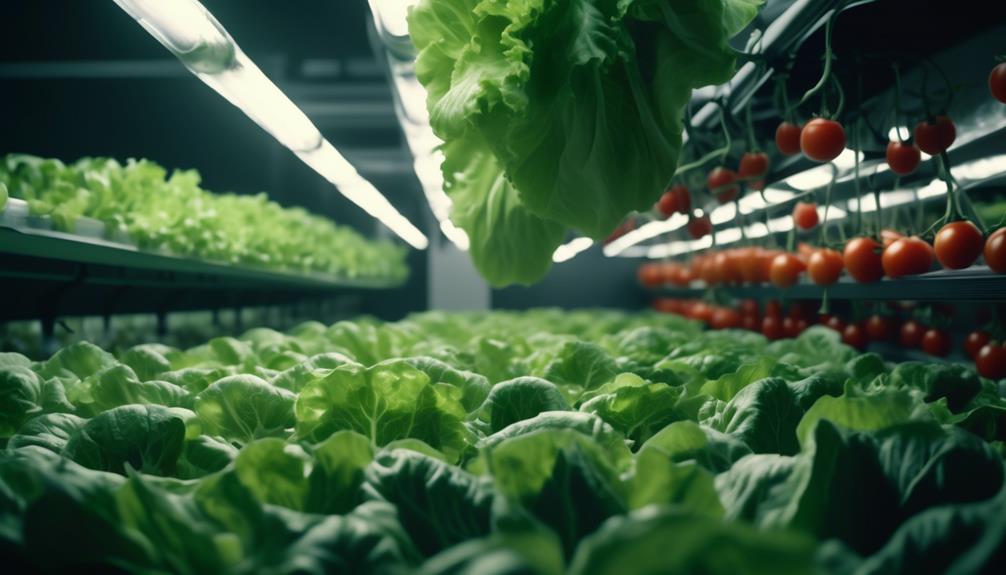Hey there! In this guide, I’ll walk you through the world of pH and EC levels in hydroponics. We’ll explore why these levels are crucial for your plants’ health and how to measure and adjust them for optimal growth.
I’ll also share some valuable tips to help you maintain a well-balanced pH and EC in your hydroponic system.
Table of Contents
Get ready to dive into the fascinating world of hydroponics and unlock the secrets to successful plant cultivation!
Key Takeaways
- Maintaining the right pH level is crucial for plant growth in hydroponics.
- EC levels determine nutrient uptake and absorption by plant roots.
- pH meters and EC meters are used to measure acidity/alkalinity and nutrient concentration.
- Regular monitoring, calibration, and adjustments are necessary to maintain balanced pH and EC levels in hydroponics.
Understanding Ph Levels in Hydroponics
I find it crucial to understand the importance of pH levels in hydroponics.
pH, which stands for potential of hydrogen, measures the acidity or alkalinity of a solution.
In hydroponics, maintaining the right pH level is essential for the optimal growth and development of plants.
Common pH problems in hydroponics include pH levels that are too high or too low, which can lead to nutrient deficiencies or toxicities.
To address these issues, pH buffering techniques are employed.
These techniques involve the use of pH buffers, such as potassium hydroxide or phosphoric acid, to adjust and stabilize the pH of the nutrient solution.
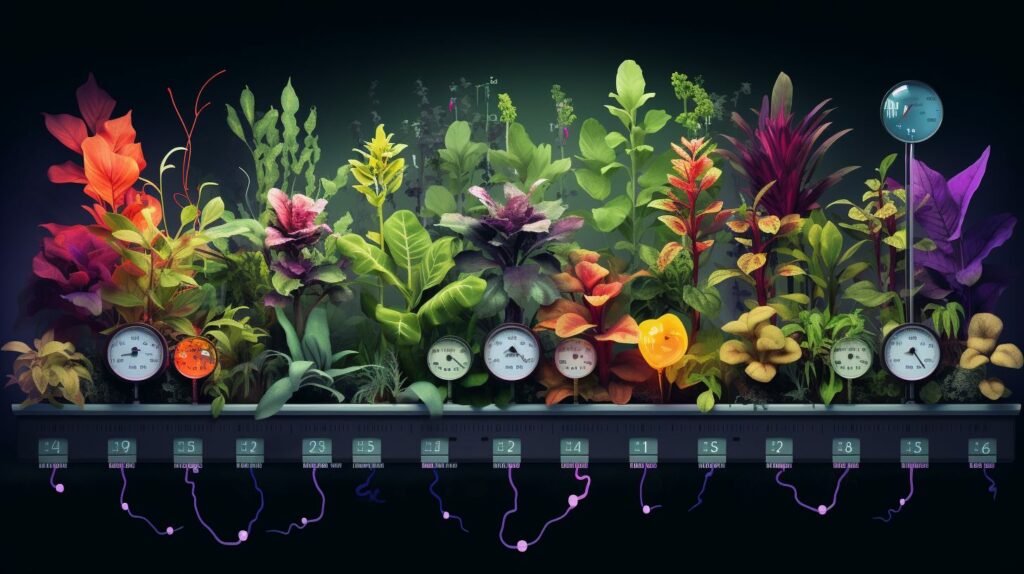
The Importance of EC Levels in Hydroponics
Maintaining proper electrical conductivity is crucial for successful hydroponic cultivation. The EC levels, or electrical conductivity levels, play a vital role in determining the nutrient uptake in hydroponic systems. Here are four key points to understand the importance of EC levels in hydroponics:
- Accurate Measurement Techniques: Precise measurement of EC levels is essential to ensure optimal nutrient concentrations in the nutrient solution. Conductivity meters or EC meters are commonly used to measure the electrical conductivity of the solution.
- Nutrient Uptake: EC levels directly impact the nutrient absorption by the plant roots. Maintaining the right EC levels ensures that plants receive the appropriate amount of essential elements for their growth and development.
- Avoiding Nutrient Imbalances: High or low EC levels can result in nutrient imbalances, leading to deficiencies or toxicities. Monitoring and adjusting EC levels help prevent these issues, ensuring healthy plant growth.
- Crop-Specific Requirements: Different crops have varying EC level requirements. Understanding the specific EC requirements for each crop is crucial to provide the optimal growing conditions and maximize yields.

Measuring Ph and EC in Hydroponics
When measuring pH and electrical conductivity in hydroponics, it’s crucial to use accurate techniques for optimal nutrient absorption. To ensure accuracy, it’s essential to have reliable measuring equipment. pH meters and EC meters are the two primary tools used to measure these levels.
pH meters measure the acidity or alkalinity of the nutrient solution, while EC meters measure the concentration of dissolved salts. These meters provide real-time data, allowing for precise adjustments to be made.
However, it’s important to note that these meters can sometimes encounter issues. To troubleshoot, calibration and maintenance are key. Regularly calibrating the meters using standard solutions helps maintain their accuracy. Additionally, cleaning and storing the meters properly can prolong their lifespan.
Adjusting Ph and EC for Optimal Plant Growth
To achieve optimal plant growth, it’s crucial to make adjustments to the pH and electrical conductivity of the nutrient solution. These factors greatly impact nutrient uptake and overall plant health.
Here are four key considerations for adjusting nutrient solutions:
- pH level: Maintaining the correct pH level allows plants to efficiently absorb nutrients. Different plants have varying pH preferences, so it’s important to find the ideal range for your specific crop.
- Acidic or alkaline adjustments: If the pH is too high (alkaline), adding an acid solution can lower it. Conversely, if the pH is too low (acidic), adding an alkaline solution can raise it.
- Electrical conductivity (EC): EC measures the concentration of nutrients in the solution. Adjusting the EC level ensures that plants receive the right amount of essential elements without causing nutrient imbalances or toxicity.
- Monitoring and regular adjustments: Regularly testing the pH and EC levels is essential for maintaining optimal conditions. Adjustments should be made as needed to ensure plants receive the proper nutrients for healthy growth.
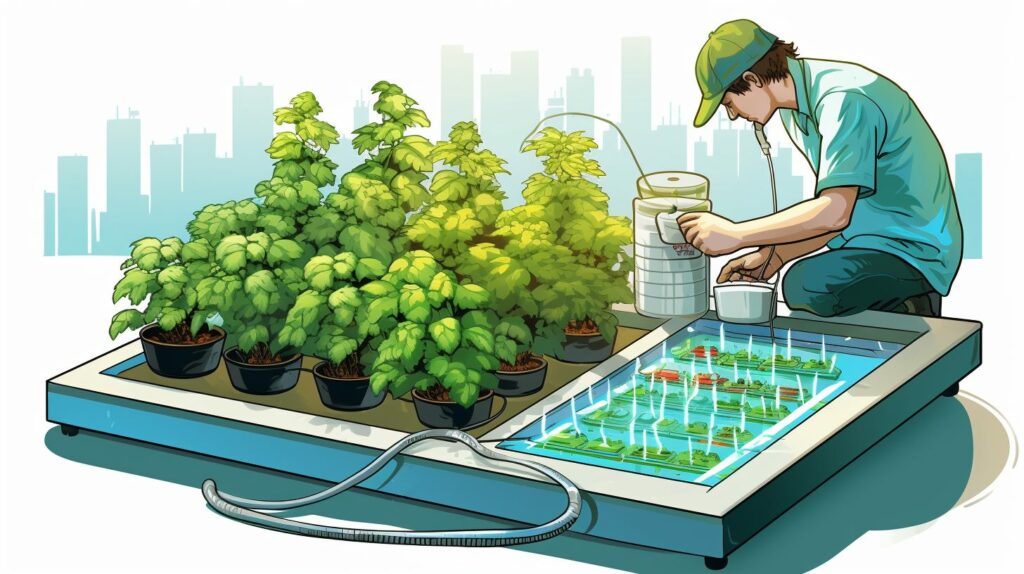
Tips for Maintaining Balanced Ph and EC Levels in Hydroponics
I find it important to regularly monitor the pH and electrical conductivity (EC) of the nutrient solution to ensure a balanced environment for optimal plant growth. Troubleshooting pH and EC imbalances in hydroponics is crucial for maintaining healthy plants. To help you understand the importance of pH and EC maintenance, here are some best practices:
| Best Practices for pH and EC Maintenance | |
|---|---|
| Monitor Daily | Regularly check pH and EC levels to identify any imbalances. |
| Adjust Nutrient Solution | Use pH adjusters to bring the pH level within the optimal range for your plants. |
| Calibrate Equipment | Calibrate pH and EC meters regularly to ensure accurate readings. |
| Flush System | Periodically flush the system to remove any built-up salts or residues. |
| Keep Records | Maintain a log of pH and EC readings to track changes over time. |
Which Hydroponic Growing Medium Is Best for Maintaining Optimal pH and EC Levels?
When it comes to maintaining optimal pH and EC levels in hydroponic systems, choosing the right hydroponic growing medium is crucial. Various hydroponic growing medium comparison options exist, each with its own advantages. Coco coir, for instance, provides excellent water retention and promotes a balanced pH. Expanded clay pebbles offer great aeration and drainage, ideal for preventing excess moisture and maintaining proper EC levels. Ultimately, selecting the best growing medium depends on the specific needs of your hydroponic setup and the crops being cultivated.
Frequently Asked Questions
Can I Use Tap Water in My Hydroponic System, or Do I Need to Use Filtered Water?
I always use filtered water in my hydroponic system because tap water can contain impurities that may harm the plants. Filtered water ensures that the plants receive only clean and pure water, leading to healthier growth and higher yields.
How Often Should I ChECk the Ph and EC Levels in My Hydroponic System?
I check the pH and EC levels in my hydroponic system regularly to maintain stability. It’s important to monitor these levels to ensure optimal nutrient uptake and avoid imbalances. Factors like nutrient solution, water quality, and plant growth can affect pH and EC levels.
Are There Any Natural Methods for Adjusting Ph and EC Levels in Hydroponics, or Do I Need to Rely on Chemical Solutions?
There are natural methods for adjusting pH and EC levels in hydroponics. Organic solutions offer benefits such as promoting plant growth and maintaining a healthy balance in the system. Chemical solutions are not the only option.
What Are the Common Signs of Imbalanced Ph and EC Levels in Hydroponics, and How Can I Identify Them?
Identifying imbalanced pH and EC levels in hydroponics is crucial for troubleshooting issues. Signs may include stunted growth, nutrient deficiencies, or leaf discoloration. Regularly monitoring and adjusting pH and EC levels ensures optimal plant health and productivity.
Can Fluctuations in Ph and EC Levels Affect Different Types of Plants Differently, or Are the Optimal Levels the Same for All Plants in a Hydroponic System?
Fluctuations in pH and EC levels can have varying effects on different plants in a hydroponic system. Optimal levels may differ, so it’s crucial to maintain the right balance for each plant’s growth and ensure maximum productivity.
Conclusion
In conclusion, maintaining proper pH and EC levels in hydroponics is crucial for optimal plant growth. Understanding the importance of these levels and how to measure and adjust them is essential for success in hydroponic gardening.
By regularly monitoring and making necessary adjustments, growers can ensure that their plants receive the right nutrients and environment for healthy development.
Remember to follow the tips provided to maintain balanced pH and EC levels and enjoy a thriving hydroponic garden.

